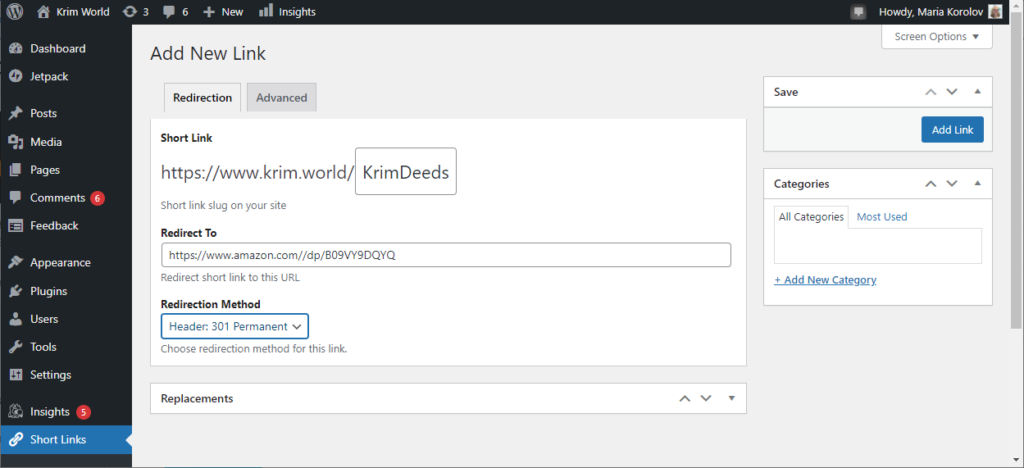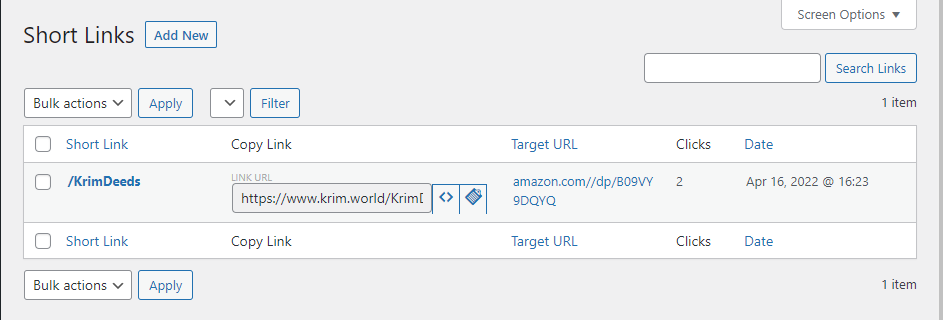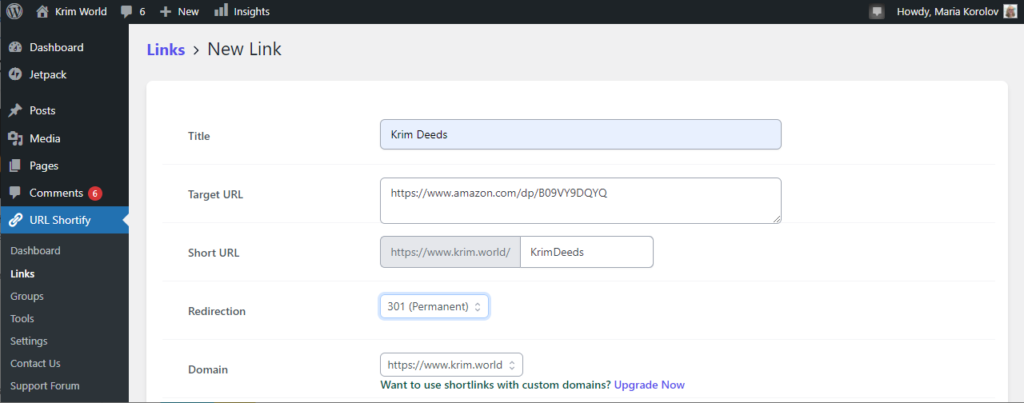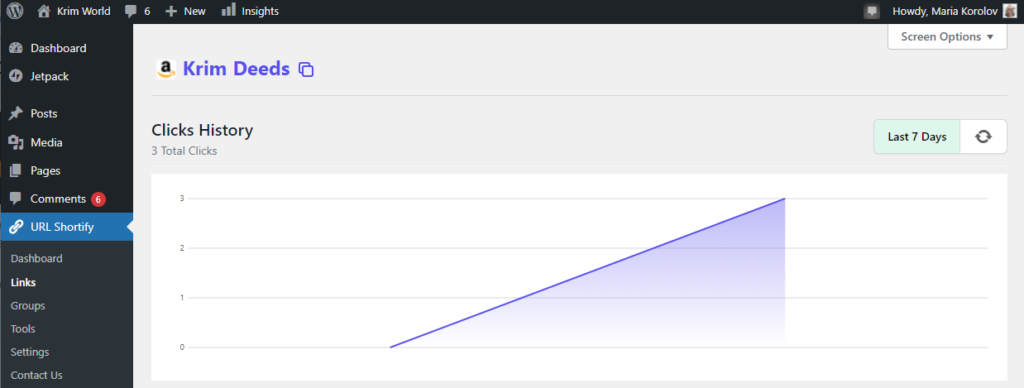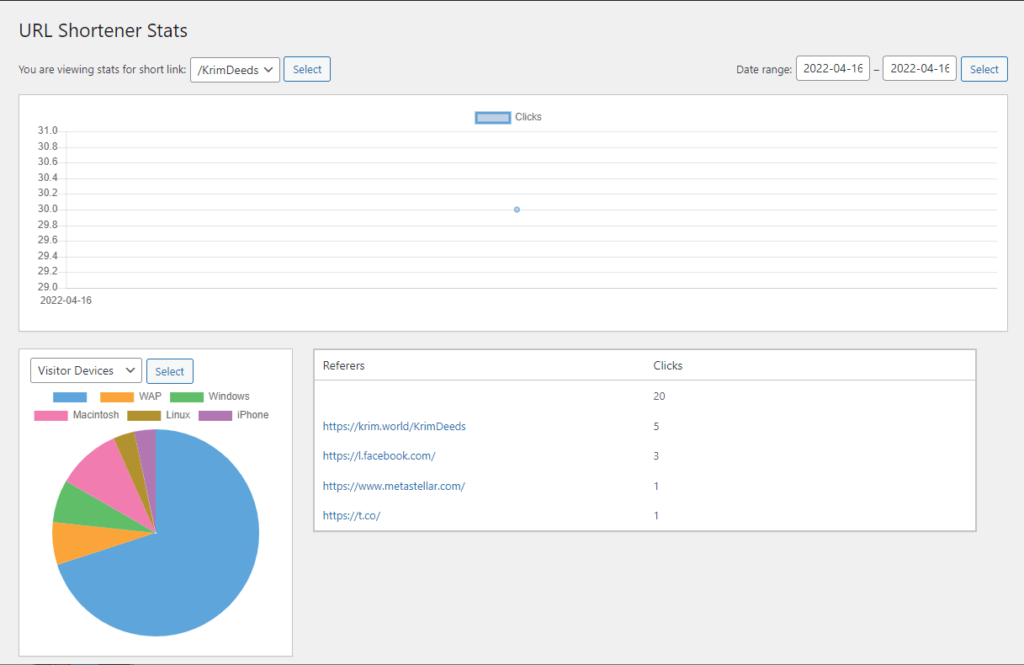
If you write reviews or guest posts in order to promote your work, you’re probably just including the link to your Amazon book page in your bio. But just having the link there doesn’t mean that people are going to click on it — and you usually have no way of knowing if they do.
In order to have marketing that works, you need to be able to tell if it’s working or not. Does it make more sense for you to spend your time on TikTok? On Facebook? On guest posting? Sending out email newsletters? Answering questions on Quora? Getting into online debates on Twitter? Sharing your personal stories on Reddit? Making guest appearances on the MetaStellar YouTube channel?
Sure, if you love a particular platform so much you’d be on it even if it didn’t do you any good, and you’ve got the time, then fine, why not stick with it? But if your time is limited, you want to focus on the channels that are having the most impact.
One way to do that is to replace the Amazon book page URL with a custom URL that you create using a link shortening service. Yes, it requires a little bit more bookkeeping up front. But once you’ve got the system set up, you’ll be able to tell where your clicks are coming from, and which channels are working best, and which used to work but aren’t working anymore.
I was reminded of this just now because I have a book to promote — yay! My third novella, Krim Deeds, hit Amazon yesterday, and its free promotion started today. It would be a shame to waste a free promotion by not telling people about it. So I’m going to share it all over Twitter, Facebook, my own websites, my newsletter list, and, of course, this post here! But if I just give that direct link to the purchase page, I’m not going to know where my book buyers are coming from.
With my first two books, Krim Times and The Lost King of Krim, I didn’t worry about it too much. I was too stressed out by everything else I was doing for those books.
But today, I’ve got a little time on my hands. The author I had been planning to interview for our YouTube channel had to postpone. So I decided to invest the time in my marketing platform.
Normally, I just use bit.ly to shorten URLs. Say, I’m giving a presentation, and I want to include a link to where people can get the full set of slides online. Instead of having a super-long URL that nobody can type, much less remember, I can create a simple and short one with bit.ly.
bit.ly
So let’s start with that one.
The basic plan is free. You get 100 free links a month, you can customize the back part of the URL — like this: bit.ly/KrimWorld — and there’s no limit to how many people can click on the new links.
But. It turns out, if you want to see your statistics from more than a month ago, you have to upgrade from the free to the paid service. And the cheapest one is $348 per year.
Yeah, that doesn’t work for me.
But if you plan to manually grab the statistics each month and save them in your own spreadsheet, then bit.ly might work well for you. 100 free links a month is more than enough for any indie author.
Myself, I don’t think I have the discipline to collect the stats each month. So, let’s see who else is out there.
Sniply
Sniply is just a little cheaper than bit.ly, at $300 a year for the basic paid plan. Or you can pay by the month, at $29 a month. But you only get 20 links per month, and there’s a limit to how many times people can click on them — you only get 500 clicks.
You get a link that looks like this: snip.ly/5ez6k3. If you want to edit that last part? It’s going to cost you $150 per month.
You do get a longer history with the free plan. From what I can tell, it looks like you can go back years, and it also offers customized buttons.
In the $79 a month plan and higher, you also get A/B testing. A/B testing means that it will show different versions of the same button or call-to-action message to see which ones work better. I do eventually want to do A/B testing. But I don’t think I’m ever going to have the budget to pay their rates. Well, if my books start selling millions, I might, but at that point I’ll be making enough that I plan to outsource all my marketing.
If you’re just starting out, you don’t care about the fact that the links look messy, you don’t have more than 20 links every month, and you don’t expect to get more than 500 clicks, this can be a good option for you.
Myself, maybe I’m being a little overly optimistic, but I want to get more than 500 clicks. So, moving on.
TinyURL
TinyURL also has a free option, and the professional one is just $13 a month.
The free plan lets you change the tail end of the URL, like this: tinyurl.com/KrimDeeds. But you have to upgrade to the paid plan if you want any data at all.
On the plus side, the paid plan is cheaper than any of the others, and it give you a bunch of info, such as what countries your clicks are coming from, or what devices they use.
URL Shortener by MyThemeShop WordPress plugin
But if you already have your own WordPress site, there’s another option — a free URL shortener plugin. For example, I have my own Krim.World website. Instead of using some third-party link shortener, I can have my own, Krim World link shortener.
The way it works is that you go to your WordPress site admin dashboard and click on Plugins > Add New , search for “URL Shortnener” and then install and activate the one titled URL Shortener by MyThemeShop. You’ll now have a new menu in your dashboard, called “Short Links.”
Click on Short Links > Add Link to add a new one.
In the image above, I’m setting up the link krim.world/KrimDeeds to point to my Amazon book page.
Unfortunately, the only data it tracks is how many times the link has been clicked.
The paid version, which is $19 a year, includes advanced statistics.
URL Shortify WordPress plugin
There are other WordPress plugins that do the same thing, such as URL Shortify.
The way it works is that you go to your WordPress site admin dashboard and click on Plugins > Add New , search for “URL Shortify” and then install and activate the one titled “URL Shortify – Simple, Powerful and Easy URL Shortener Plugin For WordPress.” You’ll now have a new menu in your dashboard, called “URL Shortify.”
Click on URL Shortify > Links to add a new one. It’s just as easy as the other plugin.
In the image above, I’m again setting up the link krim.world/KrimDeeds to point to the book’s Amazon page.
Their free version does have some historical statistics, but only going back seven days.
The paid version goes back further, but costs $69 per year.
My verdict
I like the idea of using a link shortener that’s a plugin on my WordPress site. That way, the link I offer people does double-duty. It not only sends them to the Amazon purchase page, but reminds them that I have a Krim.world website out there that they could visit.
So which plugin do I go with? To be honest, both are pretty simple to use. I don’t really need advanced statistics right now, but, when I do, $19 a year for URL Shortener by MyThemeShop sounds pretty reasonable.
But then I checked out the demo of the pro version. And it tracks where the clicks came from!
So here I was, thinking I’d have to set up multiple short URLs — one for MetaStellar blog post links, one for Twitter shares, one for Facebook shares. I was thinking of calling them KrimDeeds-MS, KrimDeeds-FB, KrimDeeds-TW, and so on. But if the plugin tracks the pages that the clicks came from, I can save all those steps. For $19 a year. Hmmm.
So, I forked over the $19 and they emailed me a download link. I downloaded the pro version of the plugin, then went to Plugins > Add New and clicked on the “Upload Plugin” button and selected the file they just sent me. Then I deactivated the free one and activated the pro version. This was a few extra steps — maybe the plugin makers could add an easy “upgrade to premium” button in the plugin in the future? Just a thought.
Best thing, once I upgraded, the link I’d already added was already in the system. Yay!
Now, let’s see if the tracking works.
Here is the announcement I just posted on Facebook:
I didn’t add in the book cover and the Amazon info — Facebook automatically added all that in when I pasted my link, krim.world/KrimDeeds.
I also posted it on Twitter. Twitter didn’t make it look all pretty, but that’s okay. I can remember to add in images and other stuff when I do it in the future.
My third book in my virtual world series, Krim Deeds, came out yesterday on Amazon — and it's now free!
Check it out here: https://t.co/dTbE3CQ5tk— Maria Korolov (@MariaKorolov) April 16, 2022
Some of the clicks are showing up in the stats, but some aren’t.
All 30 clicks in the stats page above are mine, testing out how well this plugin works. The Facebook clicks are coming up nicely. So is the click from MetaStellar and Twitter. But the ones from my other blog, Hypergrid Business, are credited to the Krim World website. And the little chart of visitor devices is completely wrong. I don’t own an iPhone or a Mac.
So it looks like I might want to set up a separate short link for Hypergrid Business specifically, or try to figure out why those links aren’t coming up in the stats. And I’ll just ignore the visitor devices chart.
But otherwise, I think this was $19 well-spent.
MetaStellar editor and publisher Maria Korolov is a science fiction novelist, writing stories set in a future virtual world. And, during the day, she is an award-winning freelance technology journalist who covers artificial intelligence, cybersecurity and enterprise virtual reality. See her Amazon author page here and follow her on Twitter, Facebook, or LinkedIn, and check out her latest videos on the Maria Korolov YouTube channel. Email her at maria@metastellar.com. She is also the editor and publisher of Hypergrid Business, one of the top global sites covering virtual reality.

